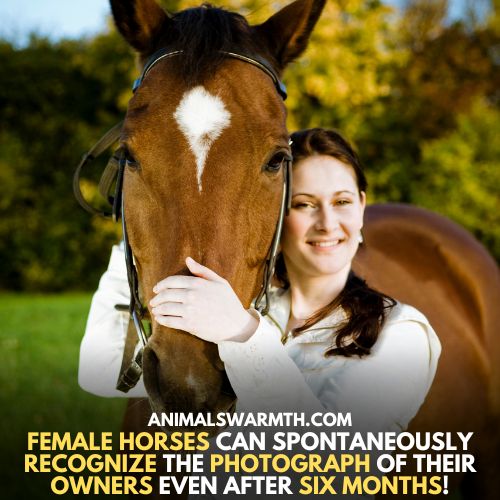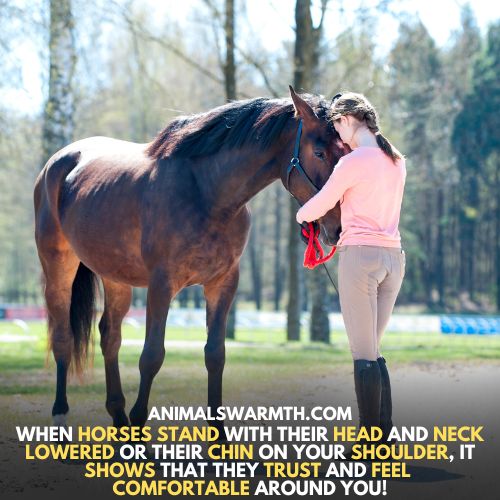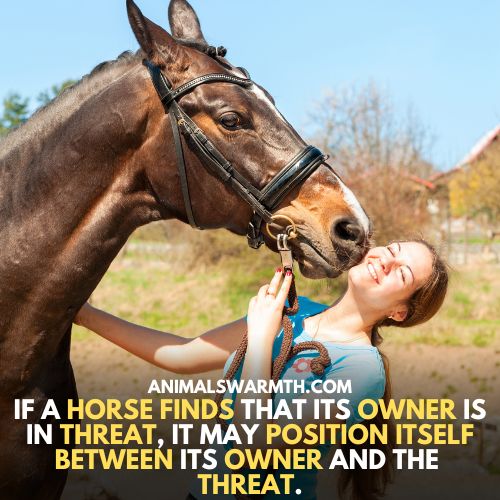Contents
Summary
- Yes, horses have feelings for their owners.
- Horses recognize the facial expression of their owner.
- Female horses can spontaneously recognize the photograph of their owners even after six months.
- Horses feel love or affection for their owners. They trust and feel comfortable around the owner.
We all know that horses are intelligent beings, but what about their emotional intelligence? Do horses have feelings for their owners? Do they form attachments and bonds with their humans?
We all know that horses are intelligent beings, but what about their emotional intelligence? Do horses have feelings for their owners? Do they form attachments and bonds with their humans?
Anecdotal evidence from horse lovers suggests that our equine friends are very emotionally attuned to us. But is there a science to back up these claims?
Let’s explore this question and find out if there’s any truth to it.
Do Horses Have Feelings For Their Owners? Scientific Studies
It has long been thought that horses are highly attuned to the emotions of their owners or handlers. And there is scientific evidence to support this claim.
A study conducted by the University of Sussex found that horses react more strongly to the negative emotions of their owners than they do to positive emotions.
When photographs of negative human facial expressions were shown to horses they looked more with their left eyes. Their heart rate increased rapidly and they exhibited stress-related behaviors.
The study also found that horses are more likely to approach their owner when they are happy, and move away when they are sad.
It was found that horses can distinguish between happy and angry facial expressions in humans. The study used photographs of human faces with different expressions, and the horses were able to correctly identify the emotion being expressed most of the time.
According to scientific research, female horses can spontaneously recognize the photograph of their owners even after six months.
So, what does all this mean? It seems that horses are indeed capable of picking up on the emotions of those around them, and they react accordingly.
So if you’re feeling down, your horse may try to cheer you up. And if you’re angry, your horse may give you some space.
Do Horses Have Feelings For Their Owners? Observational Studies
While there is scientific proof that horses can feel deep emotions like love or affection for their owners. But there is plenty of anecdotal evidence to suggest that horses have feelings.
For instance, many horse owners report that their horses seem to recognize them, even after long periods apart. Horses also respond differently to people they know and trust as opposed to strangers.

They may nuzzle and sniff a familiar person, or even whiny in greeting. And if you’ve ever seen a horse playfully nip at its owner’s clothes or hair, you know that they can be mischievous too.
There are also physiological signs that indicate that horses may form attachments to their caregivers.
For example, the hormone oxytocin is sometimes called the “bonding hormone” because it’s released when people (and animals) form close relationships.
Oxytocin levels in both horses and humans rise when they interact positively with each other. This raises the possibility that oxytocin plays a role in the bond between horse and owner.
Feelings That Horses Have For Their Owners
It is often said that horses are highly emotional creatures. This refers to their ability to experience various emotions, from joy and love to fear and anger.
But what about the feelings that horses have for their owners?
Horses Love or Show Affection
There is no doubt that horses form strong bonds with the people who care for them. Many horse owners will tell you that their horse loves them just as much as they love their horse.
There are several ways in which horses show their affection for their owners.
For example, they may nuzzle you with their nose, gently nibble on your clothes, or rest their head on your shoulder.
They may also follow you around the paddock or stable, and whinny when they see you coming.
Horses Feel Comfortable Around Owners
Horses also express their feelings through their body language.
For instance, they may stand with their head and neck lowered, or rest their chin on your shoulder. This is a horse’s way of showing that they trust and feel comfortable around you.

Of course, every horse is different and will show its affection in different ways. But there is no doubt that horses can form strong emotional bonds with the people who care for them.
So next time you’re spending time with your horse, take a moment to appreciate the special bond that you share.
Do Horses Miss their Owners?
There is no definitive answer to this question as every horse is different. Some horses may seem to miss their owners when they are away, while others may not appear to show any signs of separation anxiety.
Horses are very social animals and form strong bonds with the people who care for them. So horses may miss their owners when they are away.
If you think your horse may be missing you, try spending more time with them when you’re home. This will help to strengthen your bond and make your horse feel loved and secure.
Are Horses Loyal To Their Owners?
Horses are incredibly loyal creatures and will often form strong bonds with the people who care for them. This loyalty is often demonstrated through a horse’s body language, such as nuzzling, gently nibbling on clothes, or resting their head on their owner’s shoulder.
Horses might not show the same type of loyalty that dogs do, but they are still incredibly loyal creatures who form strong bonds with the people who care for them.
Do Horses Get Emotionally Attached?
Yes, horses can form strong emotional bonds with the people who care for them. This is often demonstrated through a horse’s body language.
Many horse owners have reported that their horse loves them just as much as they love their horse. This emotional attachment is often reciprocated by the owner, who will often show their horse affection in return.
Do Horses Protect Their Owners?
Horses are very protective creatures and will often try to defend their owners from perceived threats. This protectiveness is often demonstrated through a horse’s body language.
For instance, if a horse finds that its owner is in threat, it may position itself between its owner and the threat, or even kick out at the perceived threat. This behavior is often seen in stallions who are protecting their mares and foals from predators.

However, it should be noted that this protectiveness can also be directed towards people who are not the horse’s owner.
Therefore, it is important to be aware of a horse’s body language and to approach them with caution if they are acting aggressively.
Do Horses Have A Favorite Person?
Horses are very social creatures. As such, it is not uncommon for horses to have a favorite person. This favorite person is often the one who spends the most time with the horse and shows them the most affection.
However, every horse is different and some may not appear to have a favorite person.
Do Horses Get Jealous?
Yes, horses can sometimes be jealous of other horses or people. This jealousy is often demonstrated through a horse’s body language.
For instance, a horse may put their ears back or pin them when they see another horse receiving attention from their owner.
Alternatively, a horse may try to push another horse away from its owner. If you think your horse is feeling jealous, try spending more time with them to show them that they are still your favorite.
Do Horses Like Being Petted?
Most horses enjoy being petted, especially on the head and neck. This is often seen as a sign of affection from the horse’s owner.
However, some horses may not like being petted, particularly if they are not used to it.
It is important to be aware of a horse’s body language and to only pet them if they seem receptive to it. If a horse moves away from you when you try to pet them, it is best to leave them be.
Why Do Horses Follow Humans? Sign of Love & Trust
Horses often follow humans because they have formed a strong bond with them. This bond is often based on trust and mutual respect.
Horses may also follow their owners around the paddock or stable, and whiny when they see them coming.
However, it should be noted that some horses may follow their owners out of curiosity or because they think they will get a treat. Therefore, it is important to be aware of a horse’s body language.
Conclusion
Horses can form strong emotional bonds with the people who care for them.
It is important to be aware of a horse’s body language so you can understand what they are trying to communicate. Most horses enjoy being petted, but some may not.
Finally, remember that every horse is different and will show its affection in different ways.
What do you think? Do horses have feelings for their owners? Let us know in the comments below.
References
- Smith, A. V., Proops, L., Grounds, K., Wathan, J., & McComb, K. (2016). Functionally relevant responses to human facial expressions of emotion in the domestic horse (Equus caballus). Biology letters, 12(2), 20150907.
- Horses can read human emotions Science Daily https://www.sciencedaily.com/releases/2016/02/160209221158.htm
- Lansade, L., Colson, V., Parias, C., Trösch, M., Reigner, F., & Calandreau, L. (2020). Female horses spontaneously identify a photograph of their keeper, last seen six months previously. Scientific reports, 10(1), 1-9.
- Do Horses Get Emotionally Attached To Their Owners Like Dogs Do? Equi Supermarket
- Lansade, L., Nowak, R., Lainé, A. L., Leterrier, C., Bonneau, C., Parias, C., & Bertin, A. (2018). Facial expression and oxytocin as possible markers of positive emotions in horses. Scientific reports, 8(1), 1-11.
